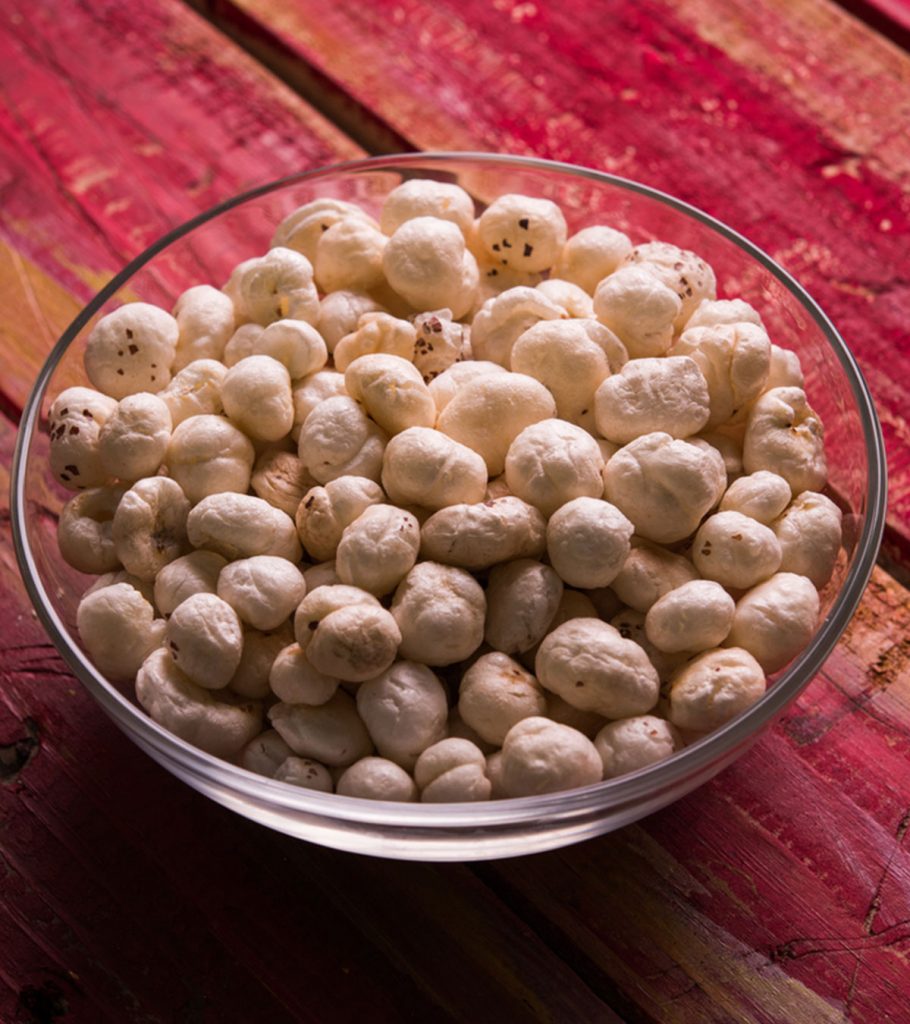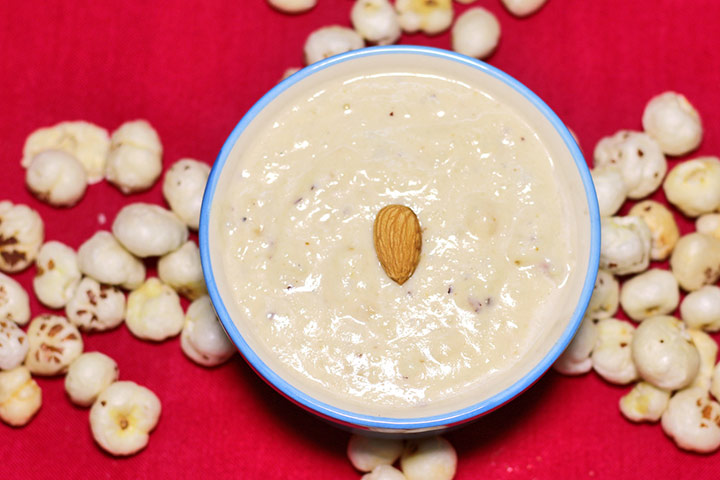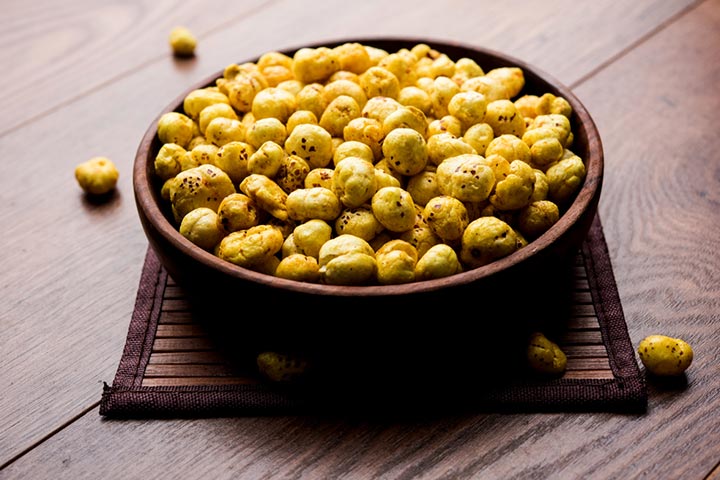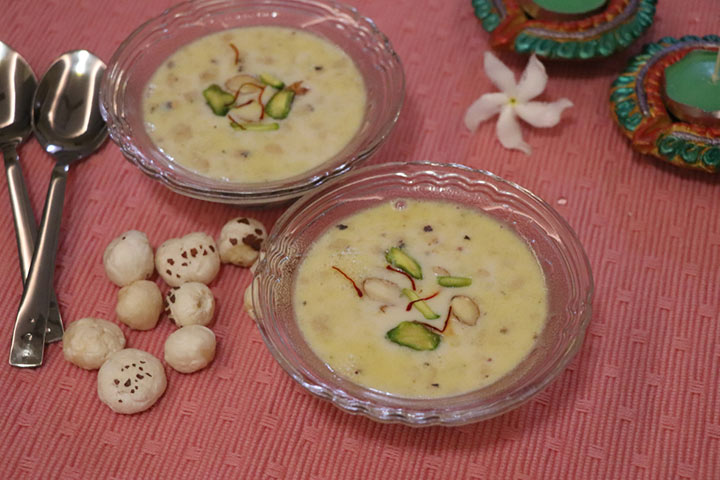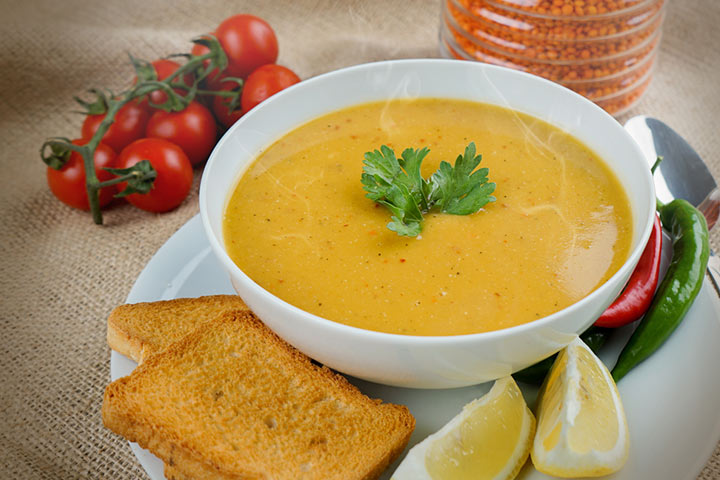Many parents may consider makhana for babies’ meals. Makhana is an Indian word for roasted and popped seeds of the prickly water lily plant (also called fox nut or Gorgon plant). The word also refers to the roasted and popped seeds of the lotus plant. Nevertheless, both the seed types have a similar appearance and almost identical nutritional profile.
The seeds have a diverse nutrient profile, making them a safe and excellent addition to baby food. In this post, we share about the safe age to introduce makhana to babies, its nutritional profile, safe ways to feed it to a baby, and some makhana recipes to try.
When Can You Introduce Makhana To Babies?
Makhana can be introduced to babies after the age of six months, around the time when the baby would start eating a variety of cereals and grains. However, like any other food, follow a three to five-day wait rule while introducing makhana. It will help rule out any possible intolerance, sensitivity, or allergy.
Parents should feed the age-appropriate form of makhana to the baby to ensure safety. Younger babies who can not chew should be served makhana as a paste or in cereal form. Older babies, who can chew, can be served fried or roasted makhana as delectable finger food.
Nutritional Value Of Makhana
Like many other edible seeds, makhana is mostly used in dried form. One cup of dried fox nut or lotus seed (32g) will provide the following nutrients against their recommended amounts to support your baby’s nutritional needs (1) (2).
| Name | Amount | RDA |
|---|---|---|
| Energy | 106 Kcal | – |
| Protein | 4.93 g | – |
| Carbohydrate, by difference | 20.6 g | – |
| Calcium, Ca | 52.2 mg | 270 mg (7-12 months) |
| Iron, Fe | 1.13 mg | 8.5mg |
| Magnesium, Mg | 67.2 mg | 75 mg (7-12 months) |
| Phosphorus, P | 200 mg | 275 mg (7-12 months) |
| Potassium, K | 438 mg | 700 mg (7-12 months) |
| Sodium, Na | 1.6 mg | 200 mg (7-12 months) |
| Zinc, Zn | 0.336 mg | 5.6 mg |
| Folate, total | 33.3µg | 32µg (7-12 months) |
| Vitamin A, IU | 16IU | 1166IU |
Sources: U.S. Department of Agriculture and World Health Organization
Probable Health Benefits Of Makhana For Babies
Regular consumption of makhana might be beneficial to the baby in the following ways.
- Support growth and development: Makhana has several essential micro nutrients such as folate, magnesium, potassium, iron, and calcium (3)that support your baby’s rapid growth and development. It also has high-quality and easy-to-digest natural protein to support your baby’s growth (4).
- Help meet energy needs: One small cup of makhana gives approximately 106 Kcal. This amount of energy can supplement the increased energy needs of growing babies. You may use makhana to promote healthy weight gain in babies.
- Regulate blood sugar: Fox nuts are low GI (glycemic indexiXA measure of how quickly specific foods (containing carbohydrates) may elevate the blood sugar levels) food that can help manage blood sugar levels. Besides, they have also shown to have anti-diabetic effects in vivo (5). However, this property can prove beneficial only when makhana is made a part of the regular diet in the right amounts.
- Might promote heart health: Research shows that lotus seeds can be good for the heart due to the presence of high amounts of potassium and magnesium and low fat percentages, thus helping regulate blood pressure (6).
- Promote sleep: Some studies show that bioactive compounds, such as flavonoidsiXA group of naturally-occurring antioxidant and anti-inflammatory compounds found in certain plant-based foods, alkaloidsiXNatural substances found in plants known for their medicinal properties, saponinsiXNatural compounds from plants known for their antimicrobial and cholesterol-reducing properties, tanninsiXA group of naturally occurring compounds found in plants, particularly in the leaves, bark, and fruit, and terpenoidsiXPlant-based compounds known for their aromatic and medicinal properties in lotus seeds, promote sleep (7).
- Might fight inflammation: Several studies show that lotus seeds have antioxidants that inhibit free radical damage to DNA. This protective effect is favorable for growing babies, in the long run (6) (8).
Studies have also demonstrated the antiviral, immunomodulatoryiXSubstances that regulate immune system functions to combat diseases and infections, diureticiXA substance or medication used to expel excess water and salts through increased urine production, and antiemetic propertiesiXAbility of a substance or medication to prevent or combat nausea or vomiting of fox nut and lotus seeds. However, your baby should consume these seeds in moderation.
Probable Side Effects Of Makhana In Babies
Makhana seldom has any side effects unless consumed in large amounts. It is still good to know these effects, especially when introducing makhana to your baby.
- Digestive issues: Makhana, when consumed in large amounts, can cause digestive disturbances. Some common digestion-related issues you might notice are bloating, flatulence, and constipation.
- Irregular heartbeat: Makhana is known to have antiarrhythmic properties. Therefore, do not feed it to babies with cardiovascular issues without consulting the doctor.
- Allergic reactions: Allergic reactions to lotus seeds are not documented. However, their possibility cannot be ruled out, especially due to cross-reactivity (9).
Tips For Selecting And Storing Lotus Seeds
The following are some simple steps that you can follow while shopping and storing makhana.
- Purchase plain popped and roasted lotus seeds or fox nuts that are free from salt, sugar, spices, preservatives, and other additives. Prefer organic varieties since they are likely to be free from harmful chemicals and compounds.
- Buy seeds from a reputed store or from a reliable brand.
- Check for damaged seeds, the presence of worms, and other contaminants when buying the seeds loose.
- Look for essential details like manufacturing and expiration dates when buying packed makhana.
- Store the makhana in an airtight container as they can turn soggy when constantly exposed to moisture.
Properly stored lotus seeds or fox nuts can be used to prepare several delectable dishes such as makhana cereal, makhana porridge, etc. for babies.
Nutritious And Delectable Makhana Recipes For Babies
Here are some age-specific vegetarian makhana recipes that you may try for your baby.
1. Makhana cereal (6+ months)
This recipe is suitable for babies who have started solids. It is easy to prepare and can be given as an instant cereal mix. You can mix it with fruit purees, vegetable purees, and other baby food, as well.
You will need:
- 1 cup plain makhana
- 1 cup plain water
How to:
- Cut makhanas into smaller pieces and put them into a bowl.
- Take a flat bottom pan and put it on medium flame. Once it is hot, pour the makhana into it to dry roast. Turn the flame to low while dry roasting.
- Once roasted makhana turns light golden brown, switch off the flame and take the pan off the stove. Let the makhana cool.
- Put the makhana seeds in the grinder. Grind until you get a smooth powder. Ensure no lumps are left.
- Sieve the powdered makhana and set aside 30-40 grams of powder. Store the remaining powder in an airtight container.
- Place a cup of water for boiling. Once the water starts simmering, add the powder to it with constant stirring.
- Stir for five to seven minutes or until the mix thickens. While stirring, ensure that no lumps are formed.
- Serve this homemade makhana porridge mix to your baby while still warm.
Tip: In case your baby does not like the bland taste of the cereal, you can add half a teaspoon of jaggery powder. You may also add cumin powder or a bit of salt if your baby likes savory dishes.
2. Roasted masala makhana (8 months+)
Roasted masala makhana makes for an excellent addition to your baby’s finger food menu.
You will need:
- 3 cups makhana
- ¼tsp black pepper powder
- ¼tsp turmeric powder
- Salt, as per taste
- 1 tsp ghee
How to:
- Chop the makhana into pieces that are small enough to not cause choking.
- Take a flat bottom iron pan and put it on low heat.
- Add one teaspoon of ghee to the pan and let it warm.
- As the ghee heats, add the makhana to it. Toss the pan occasionally and roast the makhana until they turn light brown in color and crispy in texture.
- Once done, switch off the stove and transfer the makhana to a plate. Add black pepper powder, turmeric, and salt. Mix the spices well. Taste the spice mix once and adjust the ingredients accordingly. You may add a teaspoon of jaggery powder in case needed.
Tip: You can serve larger pieces of makhana to older babies and toddlers who are already eating various other finger foods.
3. Makhana porridge or makhana kheer (1 year +)
It is a simple recipe made with protein-rich makhana and milk and can be given to babies older than a year.
Itis a simple recipe made with protein-rich makhana and milk, and can be given to babies older thanayear.
You will need:
- 1 cup makhana
- 2 cups milk
- 1 tsp jaggery powder
- ½tsp cardamom powder
- 1 tsp dry fruit powder
How to:
- Dry roast the makhana in a flat pan until they turn golden brown. Once done, keep the roasted makhana aside to cool.
- Once cooked, transfer the roasted makhana to a blender and blend it into a powder
- Take a thick bottom pan and heat milk in it.
- Once the milk starts boiling, add two to three tablespoons of makhana powder to it while stirring constantly. Ensure that there are no lumps.
- Add jaggery powder and cardamom powder. Mix everything well.
- Cover the lid of the pan and let it cook on low heat for five to seven minutes. You can keep checking the mix in between so that it may not stick to the bottom or sides of the pan.
- As the mixture thickens, adjust its consistency by adding water.
- Now, add dry fruit powder and give a thorough mix. Cook the mix for an additional two to three minutes.
- Remove from the flame and serve it to your baby while still warm.
Tip: You can add fresh cut nuts, like almond, walnut, and pistachio to the recipe. However, ensure that you cut the nuts into thin and smaller pieces. For toddlers, you may consider adding roasted sesame and pumpkin seeds in small amounts.
4. Makhana and lentil soup
This protein-rich and easy-to-digest recipe can be given to babies once they have started solids.
You will need:
- 1 cup mixed lentil
- 3 tbsp makhana powder
- ½ cup onion (diced)
- ½ cup tomatoes (diced)
- ¼ cup parsley (finely chopped)
- ½tsp ginger garlic paste
- 1 tsp mixed herb powder
- 1 tbsp virgin olive oil
- Salt, to taste
How to:
- Wash the lentils and pressure cook them. Let them cook for four to five whistles or until the lentils turn soft and mushy.
- Take a thick bottom pan and put it on medium heat. Add one teaspoon of oil to it. As it heats, add onions and ginger-garlic paste to it.
- Fry the onions until they turn golden brown. Now add tomatoes and salt and let the mix cook until the tomatoes turn soft and mushy.
- Add lentils and mix everything well. Cook for ten minutes or until the mix looks evenly cooked.
- Transfer the mix into a blending jar and keep it aside to cool.
- Once cool, blend the mixture into a smooth paste. Add water to adjust consistency. The soup should be smooth and flowy.
- Put one teaspoon of oil in the pan again. Keep the pan on low flame and slowly add makhana powder while stirring constantly.
- Add the soup to the pan and mix everything well for two to three minutes. Switch off the flame. Pour the soup in the bowl, adjust salt and sprinkle it with mixed herbs powder and parsley.
Tip: You can add seasonal vegetables to this recipe to intensify the nutritional content of the recipe. You may also add roasted seeds.
Makhana for babies is a rich source of proteins and helps strengthen their bones and muscles. But don’t consume it in large quantities as it may cause side effects, such as digestive issues or allergic reactions. Make sure that you choose plain Phool makhanas from the market and not the flavored ones, as they might cause irritation in your baby and affect their health adversely. You could also make these tasty recipes with makhana for your little one and bring a variety in taste for them.
Key Pointers
- Roasted and popped lotus or water lily seeds are commonly known as Makhana in India.
- You may introduce these energy- and calcium-rich nutritious edible seeds to a baby from the age of six months.
- Makhana promotes sleep, regulates blood pressure, and supports babies’ healthy weight gain and immunity.
Discover the exquisite blend of wholesome nutrition in our Makhana & Oats Mix Porridge Recipe, specially crafted to nourish your little one. Learn how to make it in this video!
